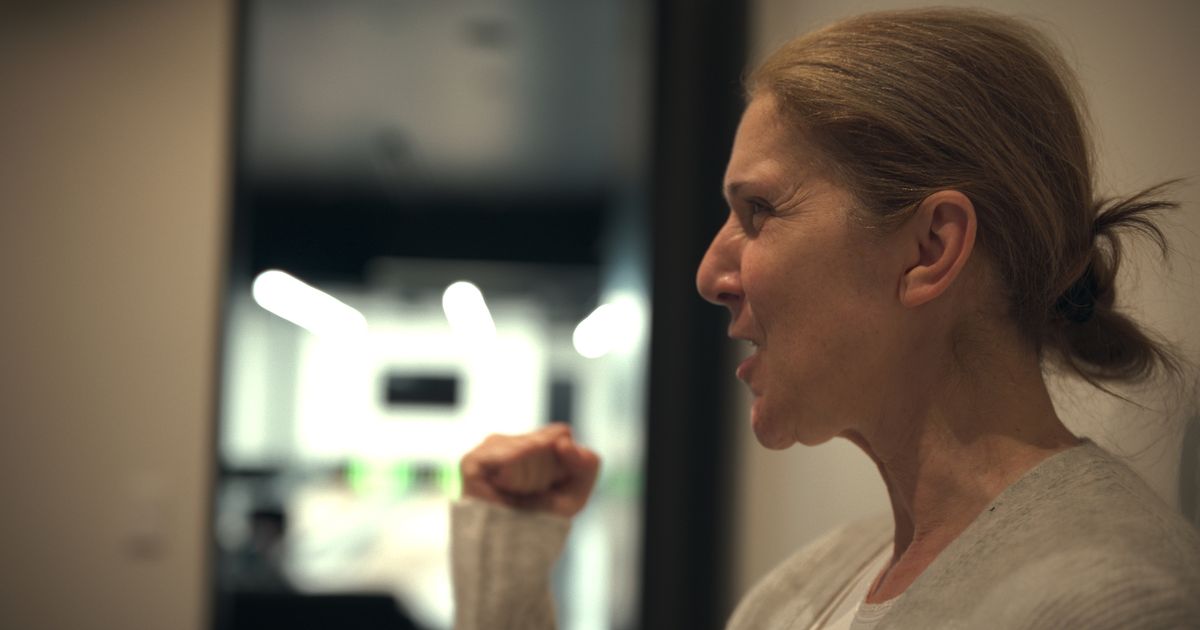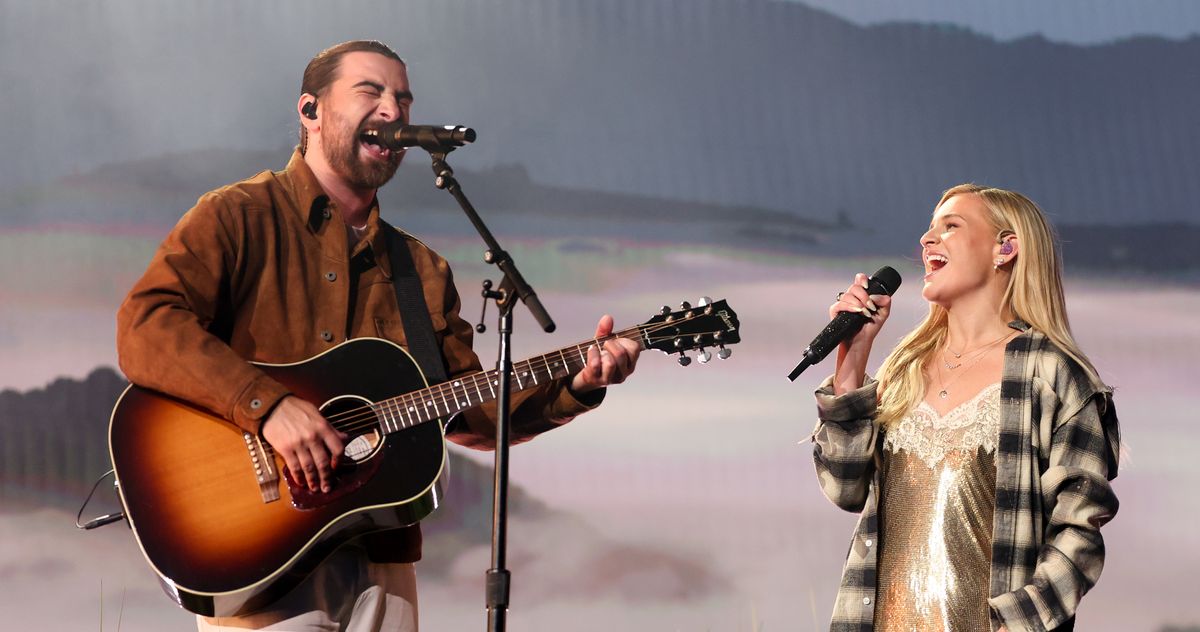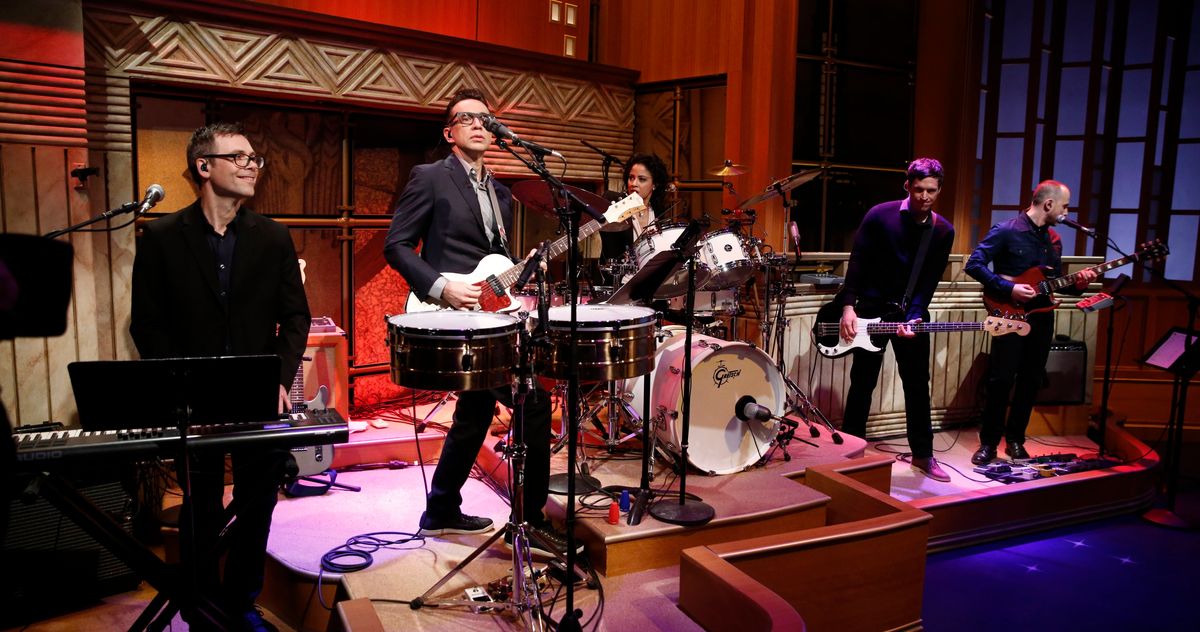“I don’t know that there’s ever been a relationship between a band and an audience like this.”
Photo-Illustration: Vulture; Photo: Jeff Kravitz/FilmMagic
Your annoying friend who won’t shut up about Phish has a point: The 40-year-old jam band with its intensely dedicated following is in an incredible groove right now. They rang in 2024 with a puppet-enhanced New Year’s gig, then brought their psychedelic improvisation skills to the Las Vegas Sphere for four sold-out nights with no repeats on the set list or the screens. They’ve also got a new album, Evolve, coming out on July 12, just in time for a summer tour that concludes with their own four-day festival (they do this kind of thing periodically) in Delaware.
But for the prolific Trey Anastasio, Phish’s primary songwriter, guitarist, and lead singer, that’s not nearly enough. You may have seen him recently sit in with Billy Joel or introduce Steely Dan at the Songwriters Hall of Fame when he should have been home practicing for some upcoming solo gigs he has with a full symphony orchestra. He also just ended a short tour with his Trey Anastasio Band, a slimmed-down quartet from the usual percussion-rich, horn-enhanced octet, following the death of saxophonist and backup vocalist James Casey.
Forming in the mid-1980s, Phish (Anastasio, bassist Mike Gordon, keyboardist Page McConnell, and drummer Jon Fishman) began as a college band based in Burlington, Vermont, playing classic rock covers and originals with fantasy-heavy lyrics — and occasional forays into barbershop quartet and vacuum-cleaner solos — before becoming a top touring act just around when Jerry Garcia died in 1995. While there are similarities between Phish and the Grateful Dead (no two shows the same, jams that can last 27 minutes, a grilled cheese and drug bazaar in the parking lot), it’s too reductive to stick with the “passing of the jam-band torch” narrative. Yes, many fans travel from town to town to see the group, but musically, Phish’s influences are far more catholic (cf., Genesis, Talking Heads, Sly and the Family Stone, Little Feat, Frank Zappa) and their output more experimental than pretty much any other band that regularly sells out Madison Square Garden (they’ve played the World’s Most Famous Arena 83 times, second only to Joel). One testament to their longevity: Phish has never had a radio hit, but they do have their own station on SiriusXM.
Talking with Trey Anastasio about all of this can be a bit like exploring an epic Phish jam with conversational cul-de-sacs, laughter, profundity, and lots of references to other musicians. Our recent conversation went well past double the scheduled time because Anastasio has lost none of the passion he has for songwriting. “I started writing songs really young,” he says, “and I write almost every day. I never expected a record deal or anything, and there’s still an element of that.”
Maybe “Free” or “Theme From the Bottom,” but I’ll say “Evolve” from the new record. It’s a Trey and Tom song that still retains that Phish “left of center” perspective. It’s similar to “Bouncing Around the Room” and one we were all happy with — it’s a little mystical with lines about “the creator” and “the math.” It speaks to our teenage obsessions with Peter Gabriel — who could really make an abstract photo with lyrics — Brian Eno, and Robert Fripp, as well as Led Zeppelin and Pink Floyd. There are some complex Phish songs where you really have to make a commitment, but “Evolve” has this simple melody. It has that pixie dust.
“The Squirming Coil,” the middle of that — the “dooo–do-dooo-do-do-do-dooooooooo” — which is very Selling England by the Pound, my favorite Genesis album by far, not even close. “Squirming Coil” has a little “Firth of Fifth.” Also “The Lizards,” the opening lines, the “passing through the corridor,” is really an homage to “At the top of the stairs, there’s hundreds of people” from “The Chamber of 32 Doors” on The Lamb Lies Down on Broadway. And “The Carpet Crawlers,” too. I was just obsessed.
I was on a call with Peter Gabriel once, and he will not touch that material now. He was so young, and he went on to create such high art, but — and I mean everything he’s done is great — it’s okay to accept that you were a deep thinker when you were young. The Beatles were all young! Just because you are young doesn’t mean you weren’t already who you are.
“Split Open and Melt.” I sure do like playing it. But I’d also like to see it. The idea, really, is to unhinge from all concepts of music and go to a place where it’s pure energy. That’s what we’re chasing. That and “Harry Hood.” And “It’s Ice.” Am I saying too many? We have a lot of songs! Oh wait, “Divided Sky”! I would like to see Phish play “Divided Sky.”
Do you ever get annoyed when the audience cheers for so long in that pause in “Divided Sky”?
Noooooo. I feel honored. I cry a lot, and I try to hide the fact that I’m crying. The depth of the friendship between the four of us — we’ve been playing that song for 40 years, we’ve watched our kids grow up — you take it all in. I’m looking at the audience, some of whom have been with us for so long. I see Big Phil. He’s one of our fans, and he’s very tall; he stands out. So I know what they are yelling about. They are yelling about their friendships. The yelling has less to do with us than the community. The fans made that happen. We never told the crowd to clap during “Stash”; they just did it and we loved it. We never told people to chant “Wilson” or to “woo” during “Twist.” And I love it — I want more “woo.” Though that has a name now, too: “Egging the woo.” I was told “Some of us don’t like it when you ‘egg the woo.’” I was like, what the heck is that?
We put a lot of care into “Mercy.” That song began with the home recordings I did, then I took it out to Mission Ballroom for the shows with Dezron Douglas and Jon Fishman, and then after last year’s Mexico Phish shows I recorded a fake album for myself. All solo acoustic versions of the new material. Different from the acoustic album I released called Mercy. This was another one! It’s got “Pillow Jets” and everything; this album only exists on my phone. So “Mercy” went through a long process before I brought it back to the band.
When we did seven nights at Madison Square Garden in 2023, we got so close. The Eras Tour was just starting, and everyone was like, “You have to do a Taylor Swift song.” It kept coming up. So we learned “Welcome to New York.” Now, that’s not my favorite of hers — I love a lot of her other stuff much better — but it was pretty good! We practiced it and had it ready, and we walked to the edge of the stage … then I was like “Naaaaaah.” Mike was sad that we bailed. He was really into it.
We love doing covers, but we have so many original songs. We play “Reba” once a year now, you know? Honestly, ever since the iPhone was invented, I feel like there is too much nostalgia. There are a lot of bands doing covers. There’s been a shift in our world. Not in the hip-hop world — that’s extremely forward-looking — but in our world there are times when it can feel like backward motion. It’s become part of the news cycle: “Oh, this jam band busts out Metallica.”
Still, classic songs are just in our DNA, like “Third Stone From the Sun” or “Mountain Jam” or anything that was on the radio a lot when we were growing up. We were in Los Angeles, and we started playing “L.A. Woman,” by the Doors — and we had not talked about it at all. But we were at the Forum, and we’re doing a “Tweezer” jam and suddenly that bass starts going like “L.A. Woman,” so I go in with the wheeeeereeeee on guitar, and I look over at Page and I know all the words, so I start singing it, and Page starts singing. Then we go to the next section of the song, but since we never planned it or practiced it, we fucked it up! Now people think we meant to cover “L.A. Woman” and did it badly! So I need to defend myself: We never meant to cover “L.A. Woman”; it’s just in our DNA!
A lot of them. I’ve found a way to … accept that voice. It’s horrific at times, but I got into all this — writing songs — when I was really really young. I had my own record player in third grade, and the first two records were Jackson Five’s Third Album, with “How Funky Is Your Chicken,” and the original cast recording of West Side Story. After that came, you know, Disraeli Gears, by Cream, and whatnot. So I was singing along and writing my own stuff, using four-track cassettes with friends. That was my social life — making early songs, written outdoors on someone’s front step, just laughing, and recording them.
So when I sing those early songs, I think about the early friendships. In the same way that if I sing “Valentine” from the Traveller album, which I wrote when I got sober, or something from Ghosts of the Forest, I think about where I was in my life then. “Drifting” is a song about my wife. These songs are all personal to me. Even the “I can’t believe this” ones, like, I dunno, “Stash.” But I love “Stash.” And “The Mango Song.”
I’m gonna hear about it if I say it. Ugh. Okay. Well … I get a lot of requests for “Fee.” And, sometimes, I’m just not feeling “Fee”!
I also get a lot of requests for “The Mango Song.” But you need to understand we never in a million years thought any of this would happen. These songs just emerged from our gang. We were just having fun. Early on at Nectar’s, it wasn’t a music venue; it was a bar. The first set the owner would tell us what to play: “Play a slow one.” We’d be doing “Mustang Sally” and whatnot. Then it was dinner time for the second set. The third set was when our friends came. Now, keep in mind the drinking age was 18. Vermont was the last state in the union to raise it. This is so, so, so crucial to understanding what happened. We would be there until 1 a.m., all of us were 18 playing this shit and cracking each other up. Funny weird stuff. “Sanity never came my way,” making up plays, making up “Gamehendge” — this was crazytown. Then at 2 a.m., we’d pile into the car and go to the quarry and go swimming. There was no “Let’s get a record contract.”
Never did I think “Meatstick” … I mean, what is “Meatstick”? “Meatstick” isn’t even a song! We were in Germany, at a party, the mini-bar was cleaned out, I had my guitar, I was making up songs about everything. If you walked in wearing that blue shirt, it’d be “Blue shirt / blue shirt.” So a German sausage was in the mini-bar. It said “BiFi Meatstick,” and I’m like, “No more alcohol, time for the meatstick!” We all start answering, “Time for the meatstick,” and we make up a dance, and everyone is laughing — then the next thing you know, you are doing it onstage at Madison Square Garden up in a hot dog!
So these songs are great, but there are also moments where you feel a real depth of pride and emotions. I don’t just want to dwell on this; it’s only one part of the pie. Newer songs like “Shade” and “Leaves” and “Life Beyond the Dream” are more gasp-inducing for me now.
My mom likes “The Connection.” We don’t play it. “Backwards Down the Number Line” could be a hit … if Taylor Swift covered it. Or maybe “Wading in the Velvet Sea?” That could be a hit. Could she make a hit out of “Ghost?” Could anyone make a hit out of “Ghost?” Maybe not.
Maybe “Fluffhead?” But, then again, “Fluffhead” kinda is about getting high! I’m opening a can of worms here, but … oh boy … okay, let’s just say the person I co-wrote “Fluffhead” with has a very different memory of the song’s origin than I do.
I don’t know if I’ve said this publicly, because this is a man I love very much. Steve Pollak, who I went to high school with — we were at a Grateful Dead concert in Lake Placid in 1984, and it was the set break, and we were on psychedelic drugs, of course. There’s a guy in front of us with a weird hat that had these things on his head. So we’re singing along to this made-up song, like we always did, just laughing. Then I went home to add stuff. The opening riff is something I had been fooling with since I first picked up a guitar. If you look at it, it’s actually very similar to the outro riff “Starship Trooper,” by Yes. When he’s sliding a C-chord around? That’s one of the first things I learned on guitar — I loved Steve Howe and Yes. Everything comes from somewhere, right?
Now, this is not Steve Pollak’s memory. His memory is that we wrote it when his brother was dying of cancer. Which, you know, is poignant, but if you listen to it — maybe decide for yourself? Is this something you would write about that? “Fluff came to New York” and “His mind was so deranged.” We were in New York for that concert. So, whatever. It’s about people who were laughing. And the middle part was me sitting at a piano composing for months and months. Nine hours a day working on an atonal fugue for the center of it, all that “doo-doo-doo-do-doooooo.” I was studying Igor Stravinsky and trying to approach his cross-rhythms, not that it rises to that. That’s my memory, but Steve’s not gonna like this.
Clockwise from left: Phish through the years. Photo: Bill Greene/Boston Globe via Getty ImagesPhoto: Catherine McGann/Getty ImagesPhoto: Jeff Kravitz/FilmMagic
From top: Phish through the years. Photo: Bill Greene/Boston Globe via Getty ImagesPhoto: Jeff Kravitz/FilmMagicPhoto: Catherine McGann/Getty Images
The organist at New York Rangers games. He’s done “Tweezer Reprise” and also “Fluffhead.”
It’s funny, though, at restaurants, any song on the radio, I’m always the first to recognize it. I hear one note — “That’s ‘Any Major Dude Will Tell You’” or “That’s ‘Ivy’ from Evermore.” I’m a little bit of a junkie. But what’s weird is people always have to point out when it’s one of our songs. It’s some kind of block; other people have to lead me to it. It’s so strange.
For our Kasvot Vaxt Halloween stunt, we debuted a bunch of new songs. In rehearsals “Say It to Me S.A.N.T.O.S.” was just another one. Then we saw the reaction. By the second time we played it, just a short while later at Madison Square Garden on New Year’s Eve, everyone knew all the words and the place went nuts. We still play it a lot.
The thing with Phish is that we believe in our audience. I don’t know that there’s ever been a relationship between a band and an audience like this. The audience are our peers, always have been. It’s a conversation. It’s sincere. There are no Grammys. It’s audience feedback. And Phish fans can be judgmental. When they think it sucks, we know about; we hear it! But when something connects, the second time we play it and everyone is singing along, we’re following the audience at that point.
Same with “What’s The Use?” I didn’t even know what that song was, then we were watching the audience breathe with it, so we played it even slower next time. I really like the song “Snowflakes in the Sand,” which Trey Anastasio Band played in 1999 and never played it again. Then people kept bringing it up. One guy in particular kept writing to our manager. So finally I played it on the last TAB tour — 25 years later, first time played by a band, and only because people told us to. I didn’t even remember it existed. “Strawberry Letter 23” came from a fan, too. I get suggestions from fans a lot. Sometimes at restaurants. Sometimes it’s a little aggressive. “You need to cover ‘Strawberry Letter 23.’” But I love Shuggie Otis; it was a good idea. We’re all adding ingredients to an enormous bowl of soup.
When we come to practice with new material, it’s “Can we try this one?” We’re at a point now where we have so many songs, so if someone asks for it, we’re like, “Well, if they want to hear it, we’ll try it.” Last tour, Mike brought “Mull” and “Casual Enlightenment” and we got the messages back. Lots and lots of people were like “I love that song ‘Mull,’” so we’re like, “Oh yeah? Okay.” Same with Mike’s “555.” Page’s “Most Events Aren’t Planned” was the same way. We played it, then days later everyone was like, “That one was cool.” That’s how it works.
There are different ways to look at what he does. The more composed songs, like “Drift While You’re Sleeping,” I was with him while he was sculpting that. Any song like that, with a lot of sections in it, like “It’s Ice,” really shows him off. But then there’s a jam song where he cuts loose, like “Undermine,” which has the flourish at the end that I love. Or a big “Down With Disease,” where he can get going — though he can also get into a trance state in those jams, which is also cool. I love the altered time signature stuff, like “Harry Hood,” it’s truly awe-inspiring. When he’s in ⅞ time going “Gabba-da-gabba-da-gabba-da,” he’s driving through it like his limbs are disconnected. He’s an athlete. No, it’s martial arts. Not that I know anything about martial arts, but I’ve seen The Karate Kid. You’ve gotta get an old man to tell you to paint the fence, then you can play like Jon Fishman.
I will talk about Jon Fishman all day if you let me. I love Jon Fishman. He was the best man at my wedding. I remember the day we met like it was yesterday. It was love at first sight, which is dorky, but I went to his dorm room, and he was practicing his drums. Last time I saw him, at the Sphere, he was practicing his drums. I thought he was the best drummer in the world in 1984, and it’s taken time for the rest of the world to catch up. I love playing with him. I can read his mind. I want to play with him forever. I hope I die first.
Anything off Sigma Oasis. “Evening Song.” And also “Leaves,” and the song “Sigma Oasis.” The synth playing is incredible.
Now, you need to understand what else Page does on piano. No Page, no Fishman, no Phish. Here’s the thing, Mike and Fishman do not play the traditional role of bass and drums. Long periods go by where Fishman doesn’t hit the downbeat. And Mike is, well, Mike exists in his own universe that we all observe — no one knows what goes on in there. Then I’m doing my thing, surging everywhere. Page keeps it all together. Page feels like the drummer sometimes with those complex songs like “Petrichor” or “Life Beyond the Dream.” He’s the rock. Page holds it all together on the piano. I’ve seen Fishman sit in with other bands, and they can’t handle what he does. So he reverts to playing 4/4 and it’s like, “Where’s the Jon Fishman I love?” Because someone has to play that. In our band, it’s Page.
So he’s great with the synthesizers and spaceship sounds, but he’s also one of the last OG rock piano players. Him and Chuck Leavell, on tour with the Stones right now, and Bill Payne from Little Feat.
What Mike does in the jams is his most unique element. We modulate regularly in these 30-minute jams. We practice it, but it’s more for the actual sound, and then I say “Mike, take us around,” and we’re up a majors and minors, but what he does that’s cool is keep it undefined in the tonal center. Mike doesn’t like straight lines. You can hear it a lot in the song “Round Room.”
“First Tube.” Plus “Sand” and “Gotta Jibboo,” because I wrote those three with Tony and Russ Lawton in 1998.
I am so glad we released the live Trey Anastasio Band live album Burn It Down, because it captured that band so well. That band is changing now, and it’s great, but there was a moment there, with Tony on bass and James Casey, who also passed away, on sax and vocals — it was 20 years to get there, 20 years of writing songs. And it all started as a trio with me, Tony, and Ray. I thank God we put out that album before two of the band members passed away.
It’s strange and poignant, because the first songs we wrote, that first day in Paul Languedoc’s garage, were “First Tube” and “Sand,” and the last song I ever played with Tony on the last show of The Beacon Jams was “First Tube.” If you look at the video, you’ll see I introduce the whole band and I forgot to introduce Tony. He says “Hey, Trey, who’s playing bass back here??” and I was like, “Oh no!” and he’s like, “Thanks for the unsolicited introduction.” He was such a funny guy. So then we paraded out at the end of the set at the Beacon Theatre, during COVID, out into the streets, but I knew he wasn’t feeling healthy at the time, so he had to sit. He didn’t join the parade, but we had our masks on and … I went out into the street, and then I never saw him again.
The Beacon Jams is the best thing I’ve ever been a part of. I can’t believe it worked. The fact that it was free, that we raised money for a good cause, that we were connecting with people during COVID when no one was allowed to do anything, plus we had the large band, and the strings and everything. We were the only lit marquee in the five boroughs, and we kept the staff employed. The doormen were crying every day, there was so much emotion everywhere. Plus my daughter was involved and everyone was on their computers at home. When we played “What’s the Use?” with the strings, that’s real emotion you are hearing. It’s one of the most artistically satisfying things I’ve ever been a part of.
Longtime lyricist Tom Marshall.
Accomplished jazz solo artist and new Trey Anastasio Band bassist.
The Burlington, Vermont, spot where Phish first earned their following.
A.k.a. the Dude of Life.
The original bass player in the Trey Anastasio Band, and one of Anastasio’s musical mentors, who died in 2021.
For eight weeks during the pandemic, Anastasio livestreamed free concerts from the empty Beacon Theatre in New York, raising over $1 million for the Divided Sky Foundation.















